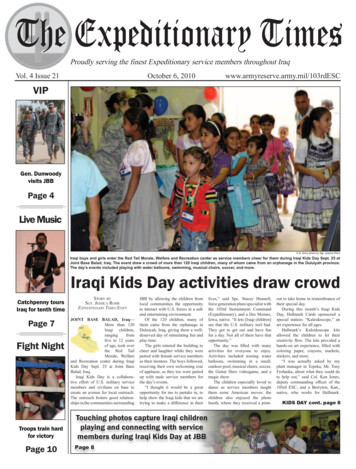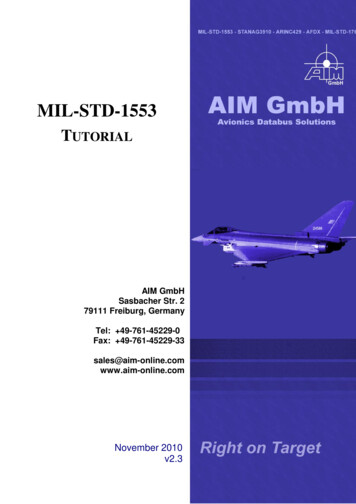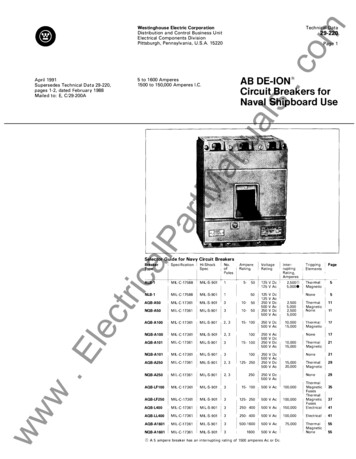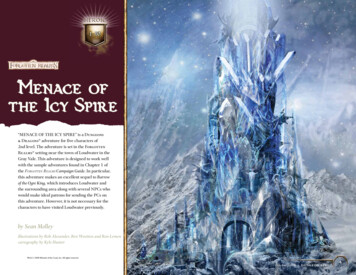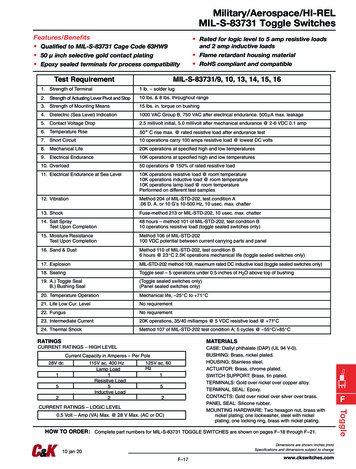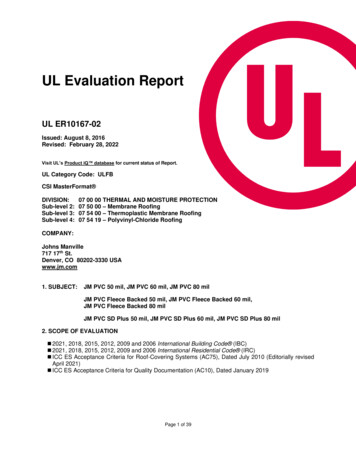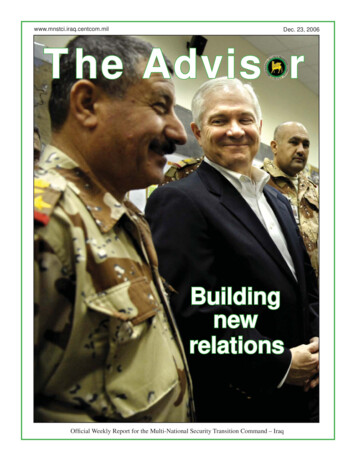
Transcription
www.mnstci.iraq.centcom.milDec. 23, 2006The Advis rBuildingnewrelationsOfficial Weekly Report for the Multi-National Security Transition Command – Iraq
Page 2Dec. 23, 2006THE ADVISORIssue 49Volume 4Trainers say they’re pleasedwith Iraqi Army progressBy Kathleen T. RhemAmerican Forces Press ServiceCommanding GeneralU.S. Army Lt. Gen. Martin E. DempseyCommand Sergeant MajorU.S. Marine CorpsSgt. Maj. Daniel BursPublic Affairs OfficerU.S. Army Col. Michael NegardDeputy Public Affairs OfficerU.S. Army Maj. Gerald OstlundPublic Affairs Operations OfficerU.S. Army Maj. Nathan M. Banks, Sr.Public Affairs NCOICU.S. Army Sgt. 1st Class Ronda JordanEditorU.S. Army Master Sgt. Rick BrownJournalistsU.S. Air ForceStaff Sgt. Zachary WilsonU.S. NavyMass Communications Specialist 2nd ClassElisandro DiazCPATT Public Affairs OfficerAnn BertucciThe Advisor is an authorized publication for members of theU.S. Defense Department and multinational partners.Contents of this paper are not necessarily the official viewsof the U.S. government or multinational partners of theU.S. Department of Defense. The editorial content of thispublication is the responsibility of the Multi-National SecurityTransition Command — Iraq Public Affairs Office.The faces of Iraqi soldiers and police have beenaltered to protect their identities.Direct questions and comments to:pao@mnstci.iraq.centcom.milMNSTC-I PAOAPO AE 09316DSN: 318-852-1334To subscribe to The Advisor,visit us online at:www.mnstci.iraq.centcom.mil/advisor.htmlON THE COVERSecretary of Defense Robert Gatesmeets with Iraqi military leaderswhile visiting the country for hisfirst time as SecDef this week.Photo by Cherie ThurlbyBAGHDAD, Iraq — Defense SecretaryRobert M. Gates learned from a U.S. Armyofficer working closely with Iraqi forces thatIraqi units are gaining confidence in theirabilities and are doing more to empowernoncommissioned officers.U.S. Army Lt. Col. Bob Morschauser,commander of Task Force 2-15 in theMahmudiyah area, along with a half dozensoldiers in his unit, ate breakfast withGates and U.S. Marine Gen. Peter Pace,chairman of the Joint Chiefs of Staff, inBaghdad Dec. 22.In a news conference a few hours later,Gates told reporters he was impressedand encouraged by what he heard fromthe soldiers. He said he was particularlyencouraged by what the Soldiers describedas the trust developing between Americanand Iraqi troops.“Their admiration for the Iraqi soldiersthat they’re working with and their beliefSecretary of Defense Robert M.Gates recently visited Iraq wherehe met with Coalition and Iraqiservicemembers to get his first lookat the country as the new SecDef .that this partnering – where the Iraqis takethe lead and where the Iraqis significantlyoutnumber the American Soldiers they’re being very successful,” Gates said.See GATES, Page 7Secretary Gates’ Holiday Message to the TroopsThis is my first holiday season as Secretary of Defense and as one of my firstacts in office, I want to extend my warmest greetings and best wishes to the men andwomen of the U.S. military and their families.There have been many times in history when Americans in uniform spentChristmas on battlefields and were stationed at posts away from their familiesand far from home. As we celebrate this holiday season, hundreds of thousands ofSoldiers, Sailors, Airmen and Marines are serving in the combat theaters of Iraq andAfghanistan, in places like Korea and Kosovo, and on ships and submarines at seaaround the world.This week, I had the opportunity to visit with U.S. and Coalition forces in Iraq. I cameaway impressed and inspired by their love of country and dedication to duty. They areserving under difficult circumstances, and that can be especially hard this time of year.In future weeks and months, I look forward to meeting many more of you– America’s servicemen and women – and having a chance to hear from you directlyand to thank you personally for your service to our country.I hope that all of you who are putting your lives at risk every day for our countryfeel the pride, affection and admiration of your fellow citizens.It is your courage that preserves the freedom we inherited from our forefathers. Itis your sacrifice and that of your predecessors that enables Americans to enjoy a safeand peaceful holiday.Know that there are millions of Americans you have never met who are thinkingof you and praying for you – for your safety; for your families; and for your success.Have a safe and happy holiday. God bless you.
Page 3Dec. 23, 2006Q&A:Iraqi Ministry of DefenseDirector of InfrastructureMr. Safa Mohamed MahmoodShihab joined the Ministry ofDefense in early 2004 as an engineerworking on the ministry’s infrastructurechallenges. Since then, he has steadilytaken on more responsibility, and wasrecently appointed as the Director ofInfrastructure.The Directorate of Infrastructure wasone of the first directorates within theMOD having been created in May 2004.DOI works closely with the MOD headquarters staff and the staffs of the IraqiArmy, Air Force and Navy, as well asIraqi Special Operations Forces, to determine property and facility requirements.Mr. Safa’s main focus is to develop andmanage projects to build and maintainmilitary camps and to repair Ministryproperties in order to provide adequateaccommodations for the Ministry’s civilian and military employees.The Advisor sat down with Mr. Safarecently to learn more about his goals andthe work of the department he leads.How do you prioritize themany new infrastructure andmaintenance projects facing theMinistry of Defense?We are giving our priorities tothe various headquarters – theground forces, the air force and the navy in addition to the other organizations. Wemeet regularly with the representatives ofthe forces and the organizations to ensurewe are meeting their needs. For instance,we are meeting today with the SpecialForces to give priorities to the projects for2007 and the 5 year plan.Q:A:What are some of the goals andPhoto by U.S. Air Force Staff Sgt. Zachary Wilsonthe end-state of the 5-year plan?Among our goals are to prepare a budgetand form the Iraqi government in order toprepare the resources for us.You seem to have many challenges.What is the greatest challenge youand your team face?One of the most difficult parts of the jobis the contracting process. For instance,in Al Anbar province, which is a veryhot area, I have a project to establishaccommodations for the soldiers in one ofour camps there. Iraqi law states that inorder to do this project, three companiesshould come forward to compete for thework. Because it is a hot area, sometimeswe cannot, [and] only one company comesforward to (bid on the) project.We are now working on exceptions topolicy for this (type of situation).“My vision (for the future) is that the Iraqi Ministryof Defense is one of the best MODs in the world.”Mr. Safa Mohamed Mahmood ShihabDirector of infrastructure, Iraqi Ministry of DefenseOn a personal note, why did youjoin the Ministry of Defense?I was a student at the college ofengineers. My goal was to join theIraqi Army as an engineer. After theliberation of Iraq, my dream cametrue and I got a job with the (CoalitionProvisional Authority). I achieved mygoal to be able to give something tomy country and my people and I am sohappy to do that.Looking into the future, five orten years from now, what do youenvision the Ministry of Defenseand the forces looking like?My vision is that the Iraqi Ministry of Defenseis one of the best MODs in the world.Is there one project that makes youmost proud?We have established the base at UmmQasr – it is the backbone of the IraqiNavy. Also, the guard towers protectingthe oil pipelines because that relates tothe economy of Iraq. Soon, the militaryhospital will be done. These are theprojects I am most proud of.
Page 4Dec. 23, 2006Medics treat Baghdad cops in exerciseBy U.S. Air ForceStaff Sgt. Zachary WilsonMNSTC-I Public AffairsBAGHDAD, Iraq — Police officersfrom the 2nd Brigade, 6th Iraqi NationalPolice Division were the recipients of abonus during a training exercise Dec.21 for the brigade’s medics. For theirparticipation as willing patients for theexercise, the police officers received oneon-one visits with an Iraqi physician andhad a medical record started, which wasa fi rst for many of the officers.The medical check-ups were part of thebrigade’s internal assessment of how well themedics can handle a large flow of patients,as well as setting the groundwork towardmoving into a brand-new medical clinic atthe same location, which will be operationalat the beginning of the year. The brigadealso brought in a doctor to assist with theexaminations and with establishing medicaldocumentation on the unit’s officers.“I want to do this every month,” saidIraqi National Police Sgt. Waleed, the unit’smedical noncommissioned officer, who hasbeen serving with the unit for more thantwo years. “The collection of the medicalrecords here was very helpful for the future when we move into the new clinic.”In addition to creating medical records,the doctor working with Waleed during theNational Police Sgt. Waleed, the 2ndBrigade, 6th Division medical NCO,gives a police officer an immunizationDec. 21 during an exercise at theBrigade headquarters in Baghdad.Photos by U.S. Air Force Staff Sgt. Zachary WilsonAn Iraqi physician conducts a check-up on a member of the IraqiNational Police Dec. 21 at the 2nd Brigade, 6th Division National Policeheadquarters. The officers received check-ups as part of an exercise.exercise evaluated the patients by askinga few questions about their general health.He also checked their blood pressure andassessed their heartbeats before determining if any additional treatment wasnecessary. From there, each patient wentto Waleed to receive any medication orimmunizations he might need. Otherwise,they were sent back to duty.“(Our) goals and objectives concerningthe exercise were met and exceeded,” saidU.S. Army Sgt. 1st Class Hugh Conlon IV,the Coalition medical advisor who has beenworking with Waleed to build up the medicalcapabilities of the brigade. This exercise willset the brigade’s medics up for success oncethe move to the new clinic occurs, he said.“The new facility will allow us to create acontinuity of care for the police that doesn’texist right now,” Conlon said. “By establishing a single location, the battalion andbrigade medics can come here for training.”The new clinic will feature a securablestorage space for medical supplies, a labset up to conduct blood tests, urinalysisand initial work-ups, and a pharmacythat will give the brigade medics morecapabilities to treat the force, Conlon said.However, before moving into the newfacility, the medics wanted to establishprocedures and create medical records sothey could hit the ground running.“We also plan to hire a full-time physician to work with the brigade medics toensure police officers get the care they needto keep the mission going,” Waleed said.Waleed put together this medical capabilities exercise, with Conlon’s assistance,to develop procedures for organizing theflow of patients and for screening themwithout becoming overwhelmed by thesheer numbers. They also purchasedmedical supplies and immunizationsspecifically for the exercise.See MEDICS, Page 7
Page 5Dec. 23, 2006An Najaf now under provincial Iraqi controlMulti-National Division – BaghdadPublic AffairsNAJAF, Iraq — The security andgovernance of nearly 1 million An Najafcitizens was officially transferred to provincial Iraqi control in a ceremony Dec.20 in southern Iraq.“Today we are saying ‘no’ to sectarianism and ‘no’ to terrorism and ‘yes’ forpeace and ‘yes’ for freedom and ‘yes’ fordemocracy,” said As’ad Abu-Galal al-Taai,the governor of An Najaf province, to acrowd of several hundred Iraqis gatheredin the city’s soccer stadium.In June 2005, Iraq’s prime ministerannounced a joint decision between theIraqi government and Multi-NationalForce – Iraq to systematically hand oversecurity responsibilities of Iraq’s provinces to provincial civil authorities underthe control of each province’s governor.“This is a terrific success for Iraq,” saidU.S. Army Brig. Gen. Vincent Brooks,deputy commanding general – support forMulti-National Division – Baghdad. “It isa major step forward in improving securityand strengthening the authority of Iraq.”An Najaf is Iraq’s fourth largest province and the third of Iraq’s 18 provinces tobe transferred to provincial Iraqi control.The Coalition transferred full control tothe provinces of Al Muthanna and Dhi Qarearlier this year. Since then, local police andmilitary forces have had full responsibilityfor security with little Coalition assistance.“I am proud of you as we assume control of our destiny,” As’ad said. “With thehelp of the people, we will have securityas promised by the constitution and theelections. This is a day of celebration.”For three-and-a-half years, the Iraqipeople in An Najaf worked alongsidePhoto by U.S. Army Sgt. 1st Class Bryan BeachIraqi police officers carry posters of Iraq’s President Jalal Talabani andPrime Minister Nouri al-Maliki before a crowd of hundreds during theProvincial Iraqi Control ceremony in Najaf Dec. 20.Coalition forces training, equippingthat only Mecca and Medina in Saudiand mentoring the police and army toArabia receive more Muslim pilgrims.take responsibility for the security and“More pilgrims will be able to enjoy Anenforcement of rule of law.Najaf’s religious sites through its pro“Transferring the security for Antected roadways and airport,” said Brooks.Najaf is an indication of the increased“In turn, this will continue stability andcapability of the Iraq Police and the Iraqiincrease the quality of life for all residents.”Army,” Brooks said. “Their capabilitiesShia religious activities were severelygrow every day and civil governance willrestricted under Saddam Hussein’s regimetake the lead for providing the provincesand observances such as Ashura have onlysecurity enforcement needs.”recently been allowed thanks to the demoNajaf, the capital of An Najaf province, is cratically elected Iraqi government. Ashuraapproximately 100 miles south of Baghdad.is a Shia religious ceremony mourning theIt is home to one of Islam’s holiest sites – the death of Imam Ali, held each year at theImam Ali Shrine. The shrine is the burialconclusion of the Hajj season.site of Imam Ali Ibn Abi Taleb, the cousinWith the change in status, Coalitionand son-in-law of the Prophet Muhammadforces are helping local police and theand a celebrated caliph, or head of state.Iraqi military take full control of securityEvery year, nearly 1 million Shia Muslimsin the region.make a pilgrimage to Najaf. It is estimated“I am proud of the Iraqi Police andthe Iraqi Army as they now assume fullresponsibility for all law enforcementand security activities in the An Najafprovince,” Brooks said. “It will be thecitizens of An Najaf who must also workwith the police to maintain and buildupon safe communities, and to enjoy theAs’ad Abu-Galal al-Taaiblessings of peace. The future of IraqGovernor of Najaf Provincedepends on its people.”“Today we are saying ‘no’ to sectarianismand ‘no’ to terrorism and ‘yes’ for peace and‘yes’ for freedom and ‘yes’ for democracy.”
Page 6Dec. 23, 2006Mahmudiyah takes pride in market renovationBy Norris JonesGulf Region Central DistrictU.S. Army Corps of EngineersBAGHDAD, Iraq — One of the toppriorities for the mayor of Mahmudiyahis rebuilding his city’s downtown market, which has been the target of numerous insurgent attacks during the pastyear. Toward that effort, the mayor hasteamed up with the U.S. Army Corpsof Engineers on a 245,000 project torebuild the area.The project includes the construction of new market stalls with overheadcover, and renovating storefronts alongthe street that have been damaged bybomb blasts and small-arms fi re. Thatwork includes new doors, windows,stucco and paint, as well as new gates ateach entrance of the market.“It’s the heart of our community,”said Mayor Muayid Fadhil. “We aregoing to build a new market as a memorial to those innocent men, women andchildren who have been killed there. Itwill tell the insurgents we will nevergive up, they cannot stop us.”About 100,000 residents in theMahmudiyah area – located 20 milessouth of Baghdad – use the market, andlocal farmers bring in their produceand meat for local consumption. It’sa main economic engine of the community, the mayor noted, “and ourresidents really appreciate the improvements that are underway.”Maj. Steve Martinelli from the U.S.Army Corps of Engineers said the market is a gathering place where familiesinteract. “It’s a source of communitypride and provides a semblance of normalcy that’s great to see,” he said.U.S. Army Lt. Col. RobertMorschauser, a task force commanderfrom the 10th Mountain Division,agrees and points out the marketrenovation clearly demonstrates thatMahmudiyah’s democratically electedgovernment is working and improvements are taking place.“Those officials are listening toU.S. Army photoHundreds of families visit the Mahmudiyah Market every day to buy freshfruits and vegetables, meat and other staples. The facility is undergoinga major renovation, including new stalls and overhead cover, and isexpected to be completed in February.their townspeople and getting thingsdone,” Morschauser said. “We’vetalked to the shopkeepers and they’revery happy with what’s going on. Thisis an excellent example that Iraqi officials are in the lead.”A number of other projects are nowunderway in Mahmudiyah, including anew primary healthcare center, schoolrenovations, new power lines, and renovation of the water treatment plant andpump station. The community is alsoplanning to build a park a few blocksfrom the market that will feature anamphitheater and soccer field.Regarding the importance of suchprojects, Mayor Muayid concluded, “Wehave to fight terrorism in different ways.We need to offer alternative activitiesfor our children that will keep themaway from the insurgents.”The Mahmudiyah market renovationproject is expected to be completed byFebruary 2007.“It’s the heart of our community. We are going to build anew market as a memorial to those innocent men, womenand children who have been killed there. It will tell theinsurgents we will never give up, they cannot stop us.”Muayid FadhilMayor of Mahmudiyah
Page 7Dec. 23, 2006Medical exercise benefits police officersFrom MEDICS, Page 4The fact that over 125 police officershad an opportunity to be seen by a doctorand given medicine to treat ailments wasa great side benefit, Conlan said“When people apply to join the NationalPolice, there is no medical vetting process,”he said. “Many of these police officershave not had any medical care before theyjoined the police force, so this is a greatchance for a doctor to get a look at themand make sure they are healthy.”The effort put out by the medics wasnot missed by the police officers whoreceived check-ups as part of their “participation” in the exercise.“I really like this. I’m glad they aredoing this,” Iraqi National Police Sgt.Sami said through an interpreter whilestanding in line to be seen by the doctor. “All of my (police officers) go out onpatrol for long shifts and they are tiredwhen they get back. They don’t reallyhave a chance to go see doctors, so thefact that they are doing this here is good.”While Sami was impressed with thenew program the medics were puttingtogether, he was troubled by the fact thatthey did not have the capability to treattraumatic injuries. He was appreciative ofthe medic’s effort to do what they could totake care of officers, but wished there wasa safer system in place for officers whoare seriously hurt on the job to go to a safeplace and receive proper care.“One of my guys got hurt by an explosion,” he said, pointing to another officerin line walking with a noticeable limpand being held-up by other officers inline. “He can’t get treatment downtownbecause it’s very dangerous for us there.”When officers are severely hurt, theyreceive limited treatment at the brigade’scurrent make-shift clinic, a one room facility that has only one bed and a desk. If theinjured officer can’t be treated there, he istransported by ambulance with a security escort to a civilian facility to receivefurther treatment, Conlan said. This is onereason why the new clinic is so important,he said. It may not feature an operatingroom, but it does allow the medics manymore options in terms of treating injuriesthat they never had before.Despite the challenges, however, Samidoesn’t second-guess his decision toserve his people. “I want to defend mycountry and take care of my brothers.That is why I joined.”Photo by U.S. Air Force Staff Sgt. Zachary WilsonAn Iraqi physician prepares to checkthe heartbeat of an Iraqi NationalPolice officer during a medicalexercise in Baghdad Dec. 21. Theexercise tested the Brigade medics’ability to organize various medicaloperations within the headquarters.Gates gets Iraqi military assessment from trainersFrom GATES, Page 2The U.S. Soldiers “described theseIraqi soldiers as being very brave andvery willing to be aggressive,” Gates said.“I found all of that very encouraging, interms of the overall strategy as we moveforward, of the Iraqis taking the lead withus in a support role,” he said.Gates touted the value of having largerunits working closely with Iraqis rather thanthe smaller teams that have been the normuntil recently. “It’s a unit that brings allkinds of resources to help the Iraqis, not justthe training, but intelligence and so on, and(the U.S. Soldiers of TF 2-15) seem to thinkthat that’s really the way to go,” he said.Pace also said he was encouraged byprogress among Iraqi military leaders. “Iwas impressed this time with the growingconfidence of the Iraqi leaders in themselves and in each other,” he said duringthe conference.Morschauser said he briefed Gates on “theimportance of continued training and supportof the Iraqi Army and the definite improvements we’ve seen over the past few months.”Morschauser’s 400-man task force isembedded with the 4th Brigade, 6th IraqiArmy Division. They are spread throughoutthe brigade and in each battalion. They liveand work with their Iraqi counterparts.Since his unit has been embedded withthis Iraqi unit, Morschauser said he hasseen significant improvements in how wellthey execute military tactics, techniquesand procedures.Morschauser said he believes the 4thBrigade, 6th Iraqi Army Division will be ableto handle their own missions within a year.One challenge in bringing Iraqi unitsup to speed is in getting them to properlyuse noncommissioned officers. “It’s a veryofficer-centric army, and what we’re tryingto do is to push them to get them to usetheir noncommissioned officers more,”Morschauser said. “They’ve got some greatnoncommissioned officers; they just don’tutilize them as well as we do.”He said many older officers resist thischange, “but there are definitely moderates,”he said. “You see some enlightened officers.”Secretary Gates said he would seekfurther advice on the issue from senior commanders, “but certainly this unit felt the waythey were doing it was working, and theyseem very content with it.”
Page 8Dec. 23, 2006IRAQI SECURITY FORCES / in briefISF conducts operations against illegal groupBAGHDAD — Iraqi Special Operations Forces, withCoalition advisors, conducted operations in Sadr City Dec.22 to capture suspects of an illegal armed group. The groupallegedly planned and conducted violent criminal activityresponsible for the injury and death of Iraqi civilians.The group also allegedly facilitated punishment committees engaged in illegal trials of Iraqi civilians who arekidnapped, tried and sentenced without any legitimate governmental authority.During the operation, a vehicle approached Iraqi forces athigh-speed. The driver ignored warnings to stop and displayed hostile intent by continuing to approach. Iraqi soldiersfi red on and disabled the vehicle.The soldiers wounded and captured three suspected terrorists during the operation, including the driver of the vehicle.One additional suspect was detained for further questioning.No Iraqi or Coalition forces casualties were reported.— Multi-National Corps – Iraq Public AffairsISF captures terrorists during raidBAGHDAD — Iraqi Police Special Forces, with Coalitionadvisors, captured four suspected terrorist cell membersand detained three other suspects Dec. 21 in Jabella, a townlocated south of Baghdad.The suspects were allegedly responsible for attacks againstIraqi police, Iraqi soldiers and Coalition forces.There were outstanding Ministry of Interior arrest warrantsfor the captured suspects.There was minimal damage and no civilian, Iraqi or Coalitionforces casualties were reported.— Multi-National Corps – Iraq Public AffairsIraqi soldiers capture al-Qaida cell leadersBAGHDAD — Soldiers from the 5th Iraqi Army Division,with Coalition advisors, captured two suspected leaders of anal-Qaida in Iraq cell and detained one other suspect Dec. 21east of Baqubah.The cell leaders were allegedly responsible for multiplebombing and small-arms attacks against civilians and security forces in the area.The al-Qaida in Iraq leaders allegedly conducted severalimprovised explosive device attacks against Iraqi SecurityForces and attacks on the homes and stores of Iraqi civilians.They were also suspected of being involved in an IED attackon the Mandali courthouse.The cell leaders were also implicated in an assassinationattempt against a senior Iraqi police officer.No civilian, Iraqi or Coalition forces casualties were reported.— Multi-National Corps – Iraq Public AffairsCaring forthe futureMore than 70 childrenparticipated in a communitycelebration at the BasrahChildren’s Hospital recently.The celebration markedthe re-commencement ofconstruction on the hospitalthat will focus on pediatriconcology. Dignitaries fromthe Government of Iraq,local government officialsand community residentsparticipated in the event.Photo by James Bullinger
Page 9Dec. 23, 2006IRAQI SECURITY FORCES / in briefIA Captures leader of insurgent cellBAGHDAD — Soldiers from the 4th Iraqi ArmyDivision, with Coalition advisors, captured a suspectedleader of an insurgent cell and detained two other suspectsDec. 21 in Taji. The cell leader was allegedly responsiblefor coordinating small-arms, car bombing and improvisedexplosive device attacks on Iraqi and Coalition forces convoys in the Taji and Tarmiyah areas.The alleged insurgent leader was also implicated in theinvolvement of illegal checkpoint operations and small-armsattacks against Iraqi civilians.No civilian, Iraqi or Coalition forces casualties were reported.— Multi-National Corps – Iraq Public AffairsISF detains AQIZ cell suspectsBAGHDAD — Iraqi Special Operations Forces, withCoalition advisors, detained four suspects of an al-Qaida inIraq cell Dec. 21 in the Rashid area of Baghdad. The groupwas allegedly responsible for the deaths of Iraqi civilians andsecurity forces in the area.The cell allegedly used improvised explosive devices andcoordinated small-arms attacks to help facilitate violence insouthern Baghdad and to threaten the local populace.No civilian, Iraqi or Coalition forces casualties werereported.— Multi-National Corps – Iraq Public AffairsIraqi police defuse car bombMAHMUDIYAH — Iraqi police discovered and dismantled avehicle-borne improvised explosive device Dec. 21 in Mahmudiyah.The police investigated the car bomb after local residentsreported a suspicious vehicle near the market. The police disarmedthe bomb and dismantled the components to render the bomb safe.The car bomb was composed of 10 57 mm anti-aircraft artilleryrounds wired into the doors and trunk.— 2nd Brigade Combat Team, 10th Mountain Div. Public AffairsIraqi Army discovers cache, kills sevenBAQUBAH — Soldiers from the 2nd Brigade, 5th IraqiArmy Division, supported by Coalition advisors, killedseven terrorists, detained three suspected terrorists anddiscovered a cache while conducting operations in theChubianat area of Baqubah Dec.19.While conducting ongoing operations to eliminate terrorists and insurgents from the Baqubah area, Iraqi soldierswere involved in several small-arms fire attacks. Insurgentforces killed one Iraqi soldier and wounded seven.With assistance from a Coalition air weapons team, seveninsurgents were killed and an additional three suspectedinsurgents were detained.While conducting patrols, Iraqi soldiers discovered a cacheconsisting of rocket-propelled grenades, mortar rounds, mortar fuses and other improvised explosive device material.A Coalition forces explosive ordinance disposal unit conducted a controlled detonation.— Multi-National Division – North Public AffairsCar bomb discovered near MahmudiyahMAHMUDIYAH — Soldiers from the 4th Brigade, 6th IraqiArmy Division responded to a report of an improvised explosivedevice Dec. 19 based on a tip from a local citizen.A local Iraqi man said he had gone to his vehicle and found anunfamiliar object on the passenger seat. Iraqi soldiers cordonedoff the area, working with the Mahmudiyah police force, anddisabled the wires on the package.— Multi-National Division – Baghdad Public AffairsNational Police detain 12 at power plant facilityPhoto by U.S. Navy MC2 Elisandro DiazGraduation dayIraqi Army Brig. Gen. (Dr.) Mahde presents acertificate to an Iraqi medic who completed amedical program at Ibn Sina hospital in BaghdadDec. 21. The students worked side-by-sidewith Coaltion medical professionals to get anunderstanding of western medicine and capablities.BAGHDAD — Soldiers from the 6th Brigade, 2nd IraqiNational Police Division detained 12 men on Dec. 19, suspected of sectarian murders at a power plant facility in theJazeera neighborhood.The raid was based on tips from local residents.The Iraqi National Police were attacked by small-arms fire,rocket-propelled grenades and improvised explosive devic
www.mnstci.iraq.centcom.mil Dec. 23, 2006 Offi cial Weekly Report for the Multi-National Security Transition Command - Iraq TThe Advis rhe Advis r BBuilding uilding nnewew rrelationselations. Page 2 Dec. 23, 2006 ON THE COVER . MOD having been created in May 2004.
